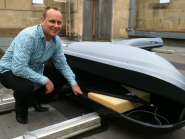Once a cosmic ray detector is built on the roof of participating schools, pupils aged 14 to 18 can take part by collecting data which is fed into a central database and accessed by fellow researchers around the globe.
Teachers are being invited to an information evening on Thursday, 24 May, to learn about the key subject areas involved - astro and particle physics, relativity, quantum mechanics and detector physics.
High energy particles, which continuously bombard the earth from outer space, generate showers in the atmosphere. The sources of these particles in terms of physics processes and production locations are still not well known.
Showers are measured by looking for coincidences between hits in detectors. Time differences give information on the angle that the shower makes with respect to the detector system.
Dr Jaap Velthuis, Senior Lecturer in the School of Physics, said: “There are a lot of unanswered questions about cosmic rays so this is a great opportunity for school pupils to help by carrying out real experimental science. There are no text book problems and no text book answers – pupils are helping to write the book themselves.
“HiSparc is very popular in Europe, with some countries having a waiting list of schools keen to take part. The first schools joined approximately 10 years ago and the programme has been rolled out to countries such as Holland, Germany, Denmark, Austria, Vietnam and Poland.
“We now want Bristol to be part of the experiment. Schools will benefit from a wealth of teaching materials, access to an annual conference, extra lab sessions, lectures and special seminars linked to the project.”
Teachers are invited to the information event on Thursday, 24 May, which begins at 6pm and is held in the HH Wills Physics Laboratory, Tyndall Avenue, Bristol, BS8 1TL. Please register before May 21 by sending an email to schools@phy.bris.ac.uk
For further information, please visit the School of Physics website.
